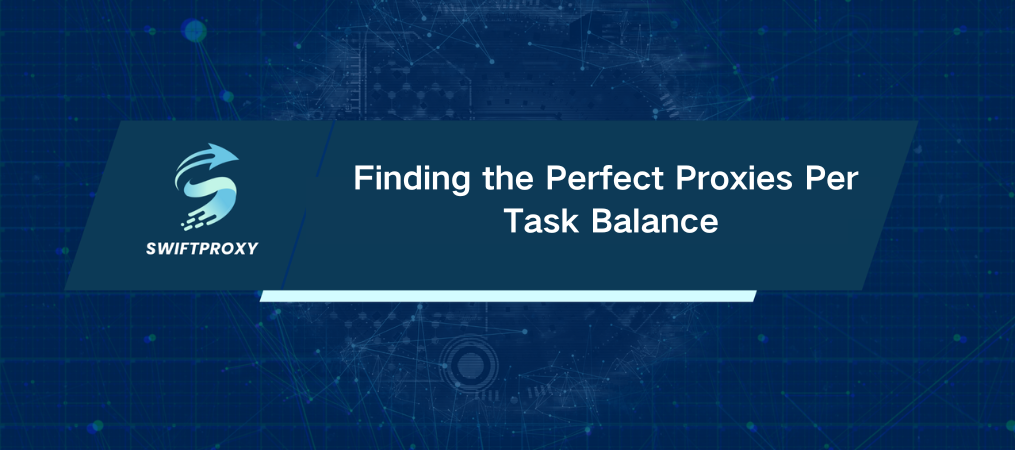Finding the Perfect Proxies Per Task Balance

Every day, an average internet user generates 2.5GB of data. That's an ocean of information. For businesses, this surge means managing vast amounts of web tasks efficiently. Enter proxies. They're essential for navigating this digital landscape. But here's the thing: getting the number of proxies per task right is crucial. Too few? You'll face bottlenecks. Too many? You'll be overspending. So, how do you strike that perfect balance?
The Golden Rule: One Proxy Per Task
If you're wondering about the perfect number, here's a simple rule: a 1:1 ratio. That means one proxy per task. Need to complete 1,000 tasks? You'll need 1,000 proxies. But that's just the starting point. The actual number of proxies required depends on a few key factors:
Scale of the Task: Larger projects demand more proxies to handle the load without a hitch.
Geographical Distribution: Proxies in different regions can bypass geo-restrictions and ensure smoother operations.
Proxy Type: Shared or private? The choice affects both performance and security.
For example, if you're scraping data across various countries, you'll need proxies located in those specific regions to maximize speed and success. Simple, right?
The Role of Proxies in Task Management
Proxies do more than just give you a different IP address. They're an integral part of managing complex tasks. Here's why:
Bypassing Restrictions: Proxies let you access content blocked in specific regions or websites.
Load Distribution: Handling multiple tasks? Distribute them across proxies to avoid overloading.
Scraping and Anonymity: Want to scrape data? Proxies help you do it anonymously, without getting detected or blocked.
Cybersecurity: Proxies act as a shield, filtering out malicious traffic and blocking harmful sites. It's like having a bodyguard for your digital life.
The world of online threats keeps evolving. Proxies? They offer a crucial layer of protection, safeguarding both individuals and businesses.
Understanding the Different Types of Proxies
Not all proxies are the same. There are two primary types: shared and private. Understanding the differences can help you make the right choice.
Shared Proxies: Economical and ideal for smaller-scale operations. But here's the catch: because you're sharing the server with others, your performance may suffer, especially when anonymity is crucial.
Private Proxies: These are dedicated just to you, providing enhanced security and speed. For businesses managing large-scale data operations or needing reliable, uninterrupted connections, private proxies are the go-to choice.
Common Proxy Allocation Mistakes to Avoid
Managing proxies sounds simple, but there are a few pitfalls to watch out for:
Overloading Proxies: If you assign too many tasks to a single proxy, expect slower speeds, higher latency, and potential timeouts. Not ideal. Spread out the load.
Underutilizing Proxies: Having too many proxies for too few tasks can drain your budget without any real benefit. Find the balance that maximizes both cost-effectiveness and performance.
Both overloading and underutilizing proxies can hinder your operations and create unnecessary expenses. A well-thought-out allocation plan is your ticket to smooth sailing.
Effective Proxy Management Practices
So, how can you optimize your proxy management? Here are some practical tips:
Regular Monitoring: Keep track of your proxies' performance—speed, reliability, and latency are key indicators. If something's off, adjust your task allocation or upgrade your plan.
Automate Monitoring: Consider using automated tools to keep an eye on things. They'll alert you to potential problems before they affect your tasks.
Prioritize Security: Always choose a reputable proxy provider that ensures secure, encrypted connections. Implement encryption protocols (SSL/TLS) to protect sensitive data from interception.
Improving Task Management Using Proxies
In the world of data management, proxies are essential. But the key to success lies in knowing how many you need and selecting the right type. Whether you're managing a few tasks or handling complex, large-scale operations, the right proxy allocation makes all the difference. So, take the time to evaluate your needs, monitor performance, and adjust accordingly. Get it right, and you'll streamline your processes, reduce costs, and ensure a smoother digital experience.
With the right proxies in place, you'll have a powerful tool in your arsenal to manage your online tasks efficiently and securely.

















































